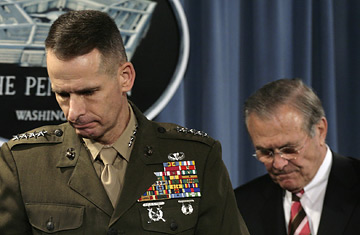
General Peter Pace (L), chairman of the Joint Chiefs of Staff, and U.S. Secretary of Defense Donald Rumsfeld.
With Defense Secretary Robert Gates's decision today to cashier Marine General Peter Pace, chairman of the Joint Chiefs of Staff, the wholesale change in those running the Iraq war — with the notable exception of President Bush — is now complete. While Gates, in a hastily called press conference at the Pentagon, blamed his decision to ease Pace toward the sidelines on the expected tough Senate fight that would accompany his renomination to a second two-year term, that would have been a fair price to pay if Gates, and Bush, had felt in the mood to defend how the war has been waged. Gates announced that Admiral Mike Mullen, the current chief of naval operations, will replace Pace.
The jettisoning of Pace, a respected Marine officer, was widely attributed in the Pentagon to the baggage he carried from the Rumsfeld era. In some cases, such as Pace's willingness to endorse waging the Iraq war with relatively few U.S. troops, he was seen as being too willing to bend to the will of his civilian superiors. With Pace's departure, a pair of new faces — Mullen and Air Force General James Cartwright, the commander of the Strategic Command, who will become vice chairman of the Joint Chiefs — will be able to develop a freshened Iraq policy without being encumbered by positions they have taken in the past, defense officials said. Pace's two-year tenure is half the time most chairmen have served; the only others to serve for that short a period were Army General Lyman Lemnitzer, from 1960 to 1962, and his successor, Army General Maxwell Taylor, from 1962 to 1964.
The civilian architects of the war — ex- Defense Secretary Donald Rumsfeld, former Deputy Defense Secretary Paul Wolfowitz, and former under secretary of defense for policy Douglas Feith — have all left. Now, all the key uniformed officers who carried it out have also been consigned to the history books. They include Army Generals Tommy Franks and John Abizaid, former Central Command chiefs now retired, who actually oversaw the war, as well as Pace and Navy Admiral Edmund Giambastiani Jr., Pace's successor as vice chairman, who served as the President's key military advisers. Before becoming the first Marine chairman in Joint Chiefs history, Pace had served as vice chairman for four years.
"My intent had been to renominate both General Pace and Admiral Giambastiani, but I think that the events of the last several months have simply created an environment in which I think there would be a confirmation process that would not be in the best interests of the country," Gates told reporters at the Pentagon.
The nomination of Mullen to the top job, coming alongside the recent ascension of Admiral William Fallon to replace Abizaid as the Central Command chief, is telling, Pentagon officials say. A Navy officer is currently overseeing the war in Iraq, and another one will now be overseeing the entire U.S. military. Until the creation of the Defense Department in 1947, there was a War Department and a separate Cabinet-level Department of the Navy. Navy officers — used to total command of their vessels at sea in the days before instant radio communications — tend to be more free-thinking than their ground-based colleagues, even those, like Pace, who come from the Marine Corps.
Pace had generally served in a low-key, non-confrontational style. The sole recent blip came in March, when he said that homosexual conduct was incompatible with military service because he believes it to be "immoral." Gates took a mild swipe at Pace following that comment, saying that "personal opinion really doesn't have a place here" at the Pentagon.
